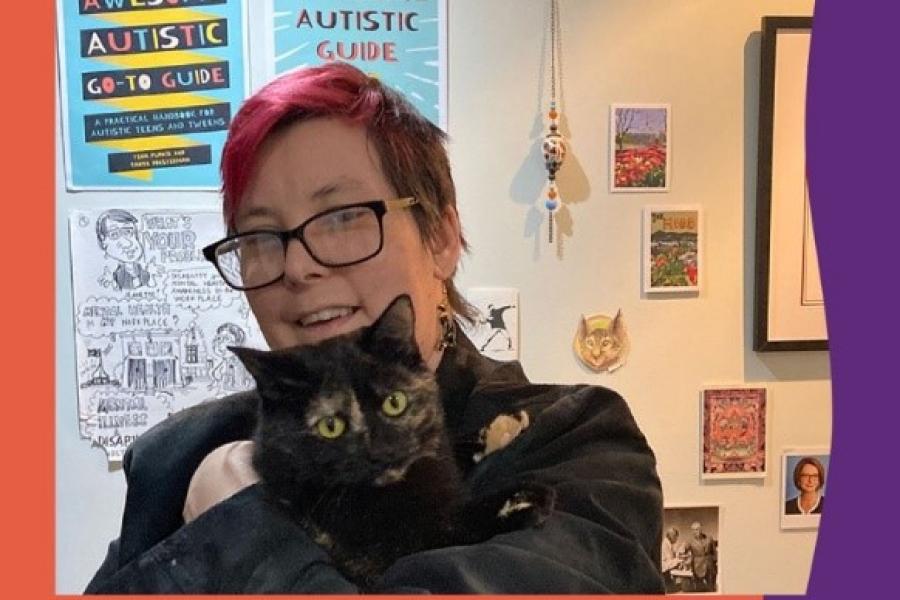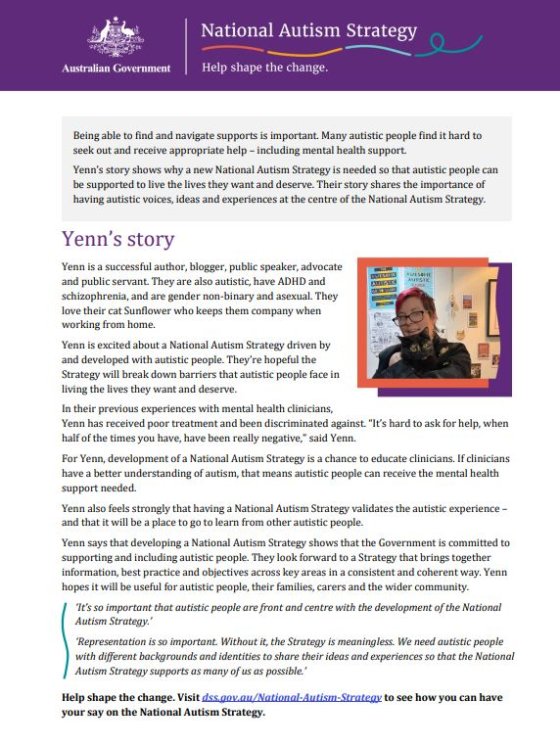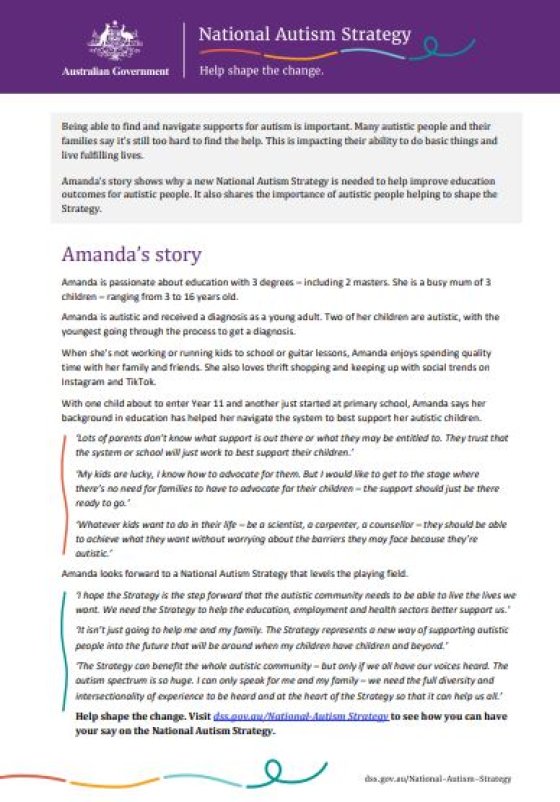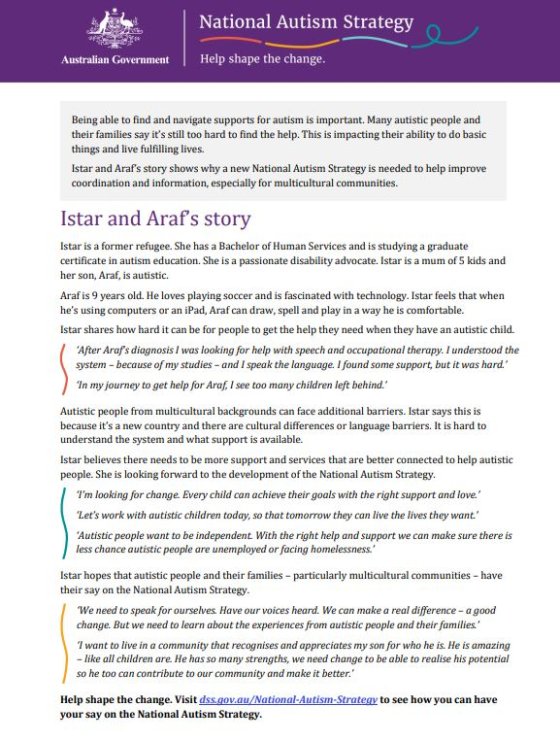Autistic people share their stories
The National Autism Strategy will make a difference
Autistic people are at the heart of the National Autism Strategy.
Being able to find and navigate supports for autism is important. Many Autistic people and their families say it’s still too hard to find help. This is impacting their ability to do basic things and live fulfilling lives.
View or read these stories to learn why the strategy is important and what it means to them.
Dani’s story
Dani is 53-year-old Autistic and ADHD provisional psychologist. Dani is passionate about helping others understand what it means to be Autistic.
Jen’s story
Jen is a 50-year-old Autistic woman diagnosed at 37-years-old. Having had experience of unemployment and under employment, Jen hopes the Strategy will mean Autistic people can more easily find satisfying and rewarding work.
Kirk’s story
Kirk is a 30-year-old Autistic person. He hopes the strategy will give Autistic people – particularly those who are marginalised – more opportunities.
Nick’s story
Nick is an Autistic Elder that hopes to see a strategy that builds connectivity between Autistic people in Australia.
Yenn’s story

Yenn is a successful author, blogger, public speaker, advocate, and public servant. They are also Autistic, have ADHD and schizophrenia, and are gender non-binary and asexual. They love their cat Sunflower who keeps them company when working from home.
Yenn is excited about a National Autism Strategy driven by and developed with Autistic people. They’re hopeful the strategy will break down barriers that Autistic people face in living the lives they want and deserve.
In their previous experiences with mental health clinicians, Yenn has received poor treatment and been discriminated against. ‘It’s hard to ask for help, when half of the times you have, have been really negative,’ said Yenn.
For Yenn, development of a National Autism Strategy is a chance to educate clinicians. If clinicians have a better understanding of autism, which means Autistic people can receive the mental health support needed. Yenn also feels strongly that having a National Autism Strategy validates the autistic experience – and that it will be a place to go to learn from other Autistic people.
Yenn says that developing a National Autism Strategy shows that the government is committed to supporting and including Autistic people. They look forward to a strategy that brings together information, best practice, and objectives across key areas in a consistent and coherent way. Yenn hopes it will be useful for Autistic people, their families, carers and the wider community.
‘It’s so important that Autistic people are front and centre with the development of the National Autism Strategy.’
‘Representation is so important. Without it, the strategy is meaningless. We need Autistic people with different backgrounds and identities to share their ideas and experiences so that the National Autism Strategy supports as many of us as possible.’
Yenn's story
Amanda's story
Amanda is passionate about education with 3 degrees – including 3 masters. She is a busy mum of 3 children – ranging from 3 years old to 16 years old.
Amanda is Autistic and received a diagnosis as a young adult. Two of her children are Autistic, with the youngest going through the process to get a diagnosis.
When she’s not working or running kids to school or guitar lesson, Amanda enjoys spending quality time with her family and friends. She also loves thrift shopping and keeping up with social trends on Instagram and TikTok.
With one child about to enter Year 11 and another just started at primary school, Amanda says her background in education has helped her navigate the system to best support her Autistic children.
‘Lots of parents don’t know what support is out there or what they may be entitled to. They trust that the system or school will just work to best support their children.’
‘My kids are lucky; I know how to advocate for them. But I would like to get to the stage where there’s no need for families to have to advocate for their children – the support should just be there ready to go.’
‘Whatever kids want to do in their life – be a scientist, a carpenter, a counsellor – they should be able to achieve what they want without worrying about the barriers they may face because they’re Autistic.’
Amanda looks forward to a National Autism Strategy that levels the playing field.
‘I hope the strategy is the step forward that the Autistic community needs to be able to live the lives we want. We need the strategy to help the education, employment and health sectors better support us.’
‘It isn’t just going to help me and my family. The Strategy represents a new way of supporting Autistic people into the future that will be around when my children have children and beyond.’
‘The Strategy can benefit the whole Autistic community – but only if we all have our voices heard. The autism spectrum is so huge. I can only speak for me and my family – we need the full diversity and intersectionality of experience to be heard and at the heart of the Strategy so that it can help us all.’
Amanda's story
Istar and Araf's story
Istar is a former refugee, she has a bachelor’s of human services and is studying a graduate certificate in autism education. She is a passionate disability advocate. Istar is a mum of 5 kids and her son, Araf, is autistic.
Araf is 9 years old. He loves playing soccer and is fascinated with technology. Istar feels that when he’s using computers or an iPad, Araf can draw spell and play in a way he is comfortable.
Istar shows how hard it can be for people to get the help they need when they have an Autistic child.
‘After Araf’s diagnosis I was looking for help with speech and occupational therapy. I understood the system – because of my studies – and I speak the language. I found some support, but it was hard.’
‘In my journey to get help for Araf, I see too many children left behind.’
Autistic people from multicultural backgrounds can face additional barriers. Istar says this is because it’s a new country and there are cultural differences or language barriers. It is hard to understand this the system and what support is available.
Istar believes there needs to be more support and services are better connected to help Autistic people. She’s looking forward to the development of the National Autism Strategy.
‘I’m looking for change. Every child can achieve their goals with the right support and love.’
‘Let’s work with Autistic children today, so that tomorrow they can leave the live they want.’
‘Autistic people want to be independent. With the right help and support we can make sure that there is less chance Autistic people are unemployed or facing homelessness.’
Istar hopes that Autistic people and their families, particularly multicultural communities, have their say on the National Autism Strategy.
‘We need to speak for ourselves. Have our voices heard. We can make a real difference – a good change. But we need to learn about the experiences from Autistic people and their families.’
‘I want to live in a community that recognises and appreciates my son for who he is. He is amazing – what all children are. He has so many strengths, winning change to be able to realise his potential so he too can contribute to our community and make it better.’
Read Istar and Araf’s story.


